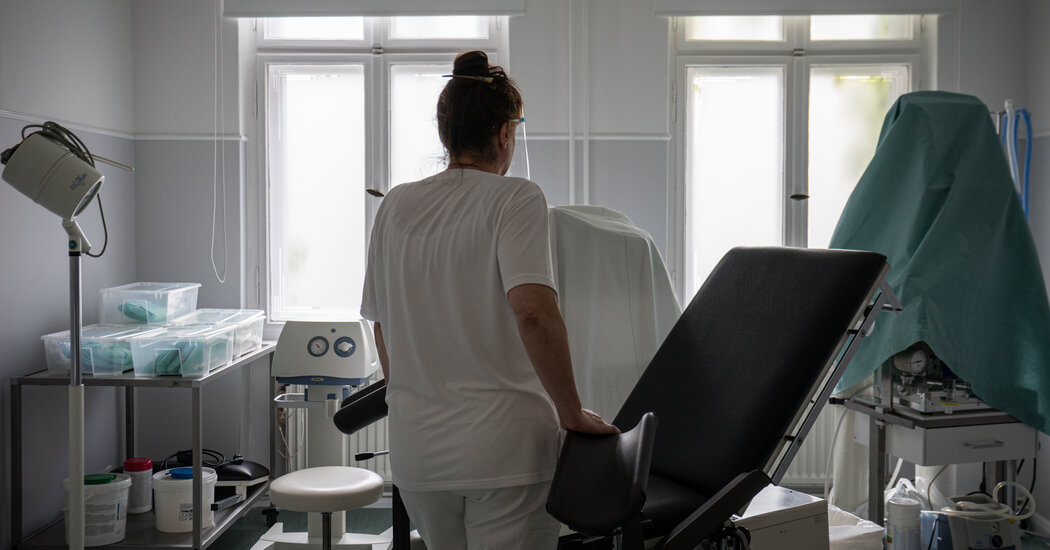
BERLIN — Lawmakers voted on Friday to end a Nazi-era ban on the advertisement of abortion services, a measure that had effectively criminalized doctors who provided information about the procedure.
The law, though ignored for years, had recently prompted several high-profile legal cases against doctors. That, in turn, led to a sustained campaign by abortion-rights activists for repeal of the advertising ban, which Germany’s relatively new government had made a goal.
Abortion in Germany is legal until the 12th week of pregnancy, after a mandatory consulting session.
“This is our day,” wrote Nora Szász, a gynecologist in the central city of Kassel, in a Tweet. Referring to the law by its criminal code number, she added: “The #219a falls and with it a piece of the worst patronization of women.”
With the U.S. Supreme Court on Friday overturning Roe v. Wade, the 1973 Supreme Court decision that had legalized abortion, the German lawmakers’ decision reflected a broad counterpoint on the issue.
“By abolishing Section 219a of the Criminal Code, we are strengthening the self-determination and safety of all women,” said Nancy Faeser, the country’s interior minister.
The vote, which was cast by a show of hands in German Parliament, was carried by the three parties of the coalition government and the far-left party.
Germany’s conservative Christian Democratic Union, which ran the previous four governments under Angela Merkel, had blocked previous efforts to purge the law from the books and voted against the repeal on Friday.
“We don’t want public advertising of abortions on the internet or social media,” Elisabeth Winkelmeier-Becker, a Christian Democratic member of Parliament, said before the vote.
Other lawmakers also opposed the repeal. “A woman’s right to sexual self-determination also includes taking responsibility for ensuring that she does not become pregnant if she does not want to,” Thomas Seitz of the far-right Alternative for Germany party, said in Parliament on Friday.
But the new government, led by Chancellor Olaf Scholz’s Social Democrats, had promised a repeal of the ban in its coalition agreement, a sort of political road map that it had presented last November.
“Today is a tremendous day,” Lisa Paus, the federal minister for families, seniors women and youth, told lawmakers before the vote. “For the physicians and above all for all women in this country.”
Germany’s action also highlights the ideological split on the issue within the Europe Union. In neighboring Poland, whose border is just an hour’s drive from Berlin, all abortions are banned.
But while neighboring Belgium and the Netherlands both have obligatory waiting periods, and France requires women seeking abortions to go through two consultations, no other European country had banned the transmission of information about the procedure the way Germany had.
“The fact that we prohibit highly qualified doctors who perform such procedures from providing factual information under criminal penalty is absurd, it is out of touch with the times, it is unjust and that is why we are ending this state of affairs,” Marco Buschmann, the justice minister, told lawmakers during the session.
The law, which dates to the Nazi era and was quietly ignored by doctors for decades, became relevant again with the rising popularity of the internet as a medical resource — raising the question of what is advertising and what is simply information — and an increase in criminal complaints from anti-abortion activists.
In 2017, Dr. Kristina Hänel, a general practitioner who offers abortions in the central town of Giessen, posted information on the procedure on her website. Because it was deemed to be advertisement, a judge fined her 6,000 euros. Instead of removing the content, she took the decision to a higher court and eventually all the way to the country’s highest court, the Constitutional Court in Karlsruhe.
The Issue of Abortion Around the World
An evolving landscape. Women’s access to abortion continues to be debated around the globe. Here’s a look at the state of affairs in some countries:
And while the court upheld the law then, and she was forced to pay a reduced fine, her case brought the issue of abortion advertising into public consciousness, and Dr. Hänel became one of the country’s best known abortion-rights activists.
Three years ago the law was altered slightly, allowing doctors to say whether they offered abortions, but the ban on advertising remained in force. Judges continued to hand down penalties, including in a 2019 ruling against a two gynecologists in Berlin who were fined 2,000 euros for writing on their site that they offered the procedure in a “protected atmosphere” and that it was “anesthesia-free” and “drug-induced.”
The ban on advertising had made finding an abortion provider very difficult, Dr. Hänel said. “Women sometimes have to call 10 doctors — where they are often treated badly — before they stumble onto someone who can provide them information.”
“Its such a relief after five years of grueling battles,” Dr. Hänel said about Friday’s vote, which she traveled the 300 miles to Berlin to witness. “I can now simply put my information back on the website so that the women who come to us can be simply be informed.”




